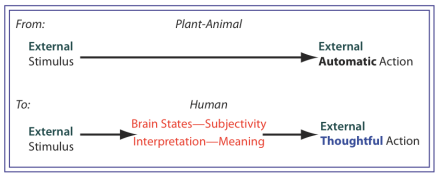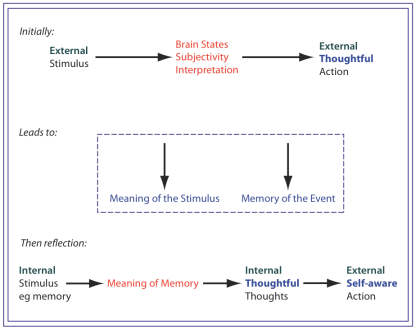A Tale of Evolution
I like stories, so I have imagined a story of how and language might have evolved. It isn't needed for the THEE framework, but there is something satisfying for me in stories where I am a participant.
Join me in exploring and imagining.
The critical evolutionary step would seem to be the move from:
- a stimulus that causes a simple reflex action or triggers a set of complex instinctive behaviours (as applies in plants, insects, animals);
to:
- some mental process intervening between stimulus and behaviour.
We might name this intervening and mediating mental process: «interpretation».

Then we are impelled to wonder:
Q:What was the result of mediation/interpretation?
A: Something exists and may persist within the person independent of the originating stimulus—which we might name the «» of the «».
The no longer short-circuited to action in the blink of an eye. It stimulated just as it always did—but the new result was:
- to generate/create what seems reasonable to name «», &
- to simultaneously delay, even inhibit, automatic-reflex reactions.
That means: a world of awareness and subjectivity, i.e. a personal point of view, entered evolution.
How extraordinary!! How amazing!! How fateful!!
Probably for the first time since life emerged, a living being was able to master his own inherited neurological-biological essence, at least to some limited degree.This ability probably varied according to the individual—much as it does now.
The «» was outside (in some sense) and the «» was inside (in some sense).
«» must have been an «existential state of the brain»—what some might now call a «state» or «content» of «the mind» or «subjectivity» or «consciousness».
Mindless sex, reflex aggressive attacks or just running away when scared didn't cease overnight. Biology was never abandoned. Such behaviour remains in evidence: because we still remain biology-based creatures with reflexes and subtle innate predispositions.
But the potential for thought, for reflection, was there. With the evolution of «» nothing would ever be the same.
Hominid existence was full of , so it became possible to create an existence full of —which meant envisaging in due course: ● a ful relationship, ● a ful life, ● a ful universe, ● a ful reduction in taxes.
And people and evolution being what they were and still are, that potential for «fulness» became realized.
«» came into existence within humanity with a fullness that filled existence and became a central distinguishing feature of our species—but…
That wasn't enough for us. Oh, no! Not nearly enough.
It wasn't enough for man to have &/or create «». «» «made sense» of «sensation». That was tremendously gratifying and so anxiety-reducing, so he and she wanted more.
By «making sense», proto-humans, just like you and I, felt they were mastering what was happening to them. By gosh it felt good. But like so many feel-good nostrums, was it just too good to be true?
Of course it was. It ended up working the other way round: «making sense» took over—subjectivity became like a drug. So «» became the master of man and his social life, and…it took on a life of its own.
Nothing has really changed since then.
Probably it was difficult for most of our hominid ancestors to be sure where actually came from—inside or outside themselves. However, the more intelligent hominids almost certainly worked out for themselves that they could «think about their own thoughts» and so they became «self-aware».
In any case, as long as man could «make sense» of things and act in a way that «made sense» to them, it surely didn't matter too much whether human was «self-aware» or not.
Oh, yes it did!
would have certainly been used to alter an individual's own s—as long as that provided a competitive advantage. That is how evolution works. Even more advantage came when was shared with others—a process we can reasonably name «».
What did this «» look like? It was nothing new—man had probably used -driven capabilities like touch, gestures, facial expression, sounds, and mimicry for tens of thousands of years, much in the way that animals do.
To triumph in the evolutionary competition, humans required more precision than could be provided by simple animal-like vocalizations and gestures.
Whichever group could refer more specifically to things like:
- particular features of places
- particular types of people
- particular forms of action
- particular types of tools
- particular strategies
- particular kinds of animals
- particular kinds of food
—would surely benefit.
Such specific and direct references were only possible through categorizing and naming.
Naming became a source of power—and names were spiritual essences.
So words emerged to provide : were used to identify «categories» as well as «specific unique things».
And words meant language. Language also evolved special words to help with proper ordering (syntax) and enable sensory pleasure in sounds. But the essence of most words originally lay in:
- making reference to relevant things, &
- making useful discriminations amongst categories of things.
Words were a wonderful solution to categorizing—you could literally «make words up». The more precise the discrimination, the greater the evolutionary advantage and the more complex the language.
So «» must be the essence (and possibly the precursor or kernel) of what we call «human language» and what simultaneously allowed for «human ».
Then, just like , took on a life of their own and brought problems...
It is still so hard to say what you mean!
Words, whether spoken or written, are —a particular sort of to be sure, but definitely .They seemed to be a bit like ordinary sensations, and a bit like memories. In any case, words, being , generate «» too, because that is what originally did and still do.
Even ignoring problems from improper use by accident or to deceive, words would have got mixed up with:
- other stimuli from surrounding events;
- the sound of the word;
- idiosyncratic memories; and
- activated feelings.
All of this meant that the «» could not last for long as a direct reference to a specific thing.
Both «words» and «the of words» changed and evolved. Given their origin, that was inevitable, and it happens to this day. Another interesting feature of words was that for most people the word, the sound of the word, the of the word, the signified object in the world and memories of the word--thing became somehow fused.
They would often occur simultaneously and they came to evoke each other instantly and automatically.
Word — objective-awareness — subjective-experience became confused.
Human beings are social creatures because sociality and collective efforts provide a competitive advantage. Sociality was selected through ordinary evolutionary pressures.
«», in the earliest days of hominid evolution, must have primarily engaged or implied biological drives associated with survival—and these affected everyone in the small clan or larger tribe. So the primary «use of language» to «» «» would have been to help with:
- finding food
- obtaining or refusing sexual relations
- rearing children
- sharing (or not sharing) simple possessions
- handling threats from animals or other humans
- dealing with fear of threats
- jockeying for power in the dominance hierarchy.
and were all about «doing» then—and they are all about «doing» now. Nothing, but nothing, has really changed. However, there is one thing that is still rather lacking in the social realm—valid knowledge.
& through doing to learn;
& through learning to know;
& through knowing to experience wonder;
& through wonder to attain wisdom;
& through wisdom to find simplicity;
& through simplicity to give attention;
& through attention to see what needs to be done;
& once we see what needs to be done
…we are here to do it now.
(Pirke Avot 5:27)
Over tens of thousands of years, and then thousands of years, and then centuries, and now decades, humanity has brought intelligence and compassion to bear on its own condition. Slowly the balance between freedom and necessity has altered through the growth of reason and science towards freedom.
Scientists recognized in recent centuries that:
- the clearer and more purposeful their communications, and
- the more precise and universal their naming and measuring,
the easier it was to develop knowledge and then apply that knowledge for the benefit of all.
However, this benefit has principally accrued within the physical realm. Mathematics, a formula-based language, has been crucial in this regard.
We should recognize that there has been progress in social life—virgins are no long sacrificed (although young girls are mutilated, and stoning to death continues); abusing and killing children is disapproved in many, perhaps most, countries; protests are at last getting more common as governments in advanced countries go about killing and torturing for «reasons of state»; and relatively few governments still support or turn a blind eye to slavery and human trafficking.
Still, it seems reasonable to suggest that progress in human relationships, political life and social tensions do not seem to show progress comparable to what we have seen in medical science, engineering and computing.
Our story suddenly jumps to the present: the time of TOP.
TOP takes a scientific perspective. It presumes that social life could—at least sometimes in some limited way—be organized and managed better if we had a somewhat clearer grasp on what we were «doing».
Specifically, in the present context, «thinking» and «doing» means: communicating better; which in turn requires: proper understanding of human fundamentals—especially perhaps in regard to .
So the time has come for me, together with whomever is ready to join in, to do the best we can to remedy this black hole. TOP, itself, is about . In this inquiry, TOP must about . It might be tricky: we will see.
- Start with the various unknown frameworks within that THEE predicts must exist.
Originally posted: Oct-2010; Last updated 30-Jul-2011
